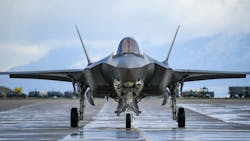Defense budgets likely to remain healthy during new Biden Administration
THE MIL & AERO COMMENTARY – We have a new presidential administration, so what does that mean for a defense industry that has gotten used to a robust defense budget over the past four years with plenty of money for technology research and development?
The short answer: it's probably too early to tell. We won't have many hints probably until March -- perhaps even as late as May. President Trump did not submit his administration's detailed defense budget proposals to Congress until May 2017, which was about four months after he took office. Most likely we should expect the same during the new Biden administration.
Long term, should we expect drastic defense budget cuts from the new administration? Probably not. We've seen different administrations come and go over the past four decades, with few drastic changes in military spending. The defense budget historically changes slowly, and in a gentle way. It doesn't mirror the sharp highs and lows we see typically in private industry.
There's a lot of money in the U.S. defense budget -- many hundreds of billions of dollars every year -- and there's no reason we shouldn't expect that to continue in the foreseeable future. There are many military programs and technology-development projects in progress that simply wouldn't make sense to stop now, or even slow down in a big way.
Many defense jobs are at stake, to say nothing about long-established corporate interests in continuing defense spending at healthy levels. We saw some relatively low military budgets during the Clinton years of the 1990s, but that had to do more with a perceived defense dividend at the end of the Cold War than it did with political differences.
After the two Bill Clinton administrations, defense spending increased in a moderate and controlled way during the George W. Bush administrations. There was concern in the defense industry of drastic budget cuts during the administrations of Barack Obama, but much of that fear was overblown. We did have the so-called "fiscal cliff" military budget drawdowns of 2012, but those were relatively short-lived and in many ways had compensation from a variety of budget resolutions to soften the blow.
If the Pentagon budget didn't exactly flourish during the Obama years, there wasn't an historic fiscal disaster, either. Spending remained relatively strong, there was little programmatic upheaval at the Pentagon, and most projects remained intact. Despite one's political biases, there is little chance to expect anything different during the Biden Administration.
It's not as though the defense industry hadn't been preparing for some kind of downslope in defense spending. For at least a couple of years now, many believed that the Trump budgets couldn't continue their upward trend sustainably, and the defense industry planned accordingly.
Less than two years ago Raytheon Co. and the defense division of United Technologies Corp. merged to form Raytheon Technologies Corp. Since Donald Trump took office in 2016 United Technologies bought Rockwell Collins; Harris Corp. and L3 Technologies merged to form L3Harris; and Northrop Grumman bought rocket-maker Orbital ATK. Not long before that, United Technologies sold its Sikorsky helicopter unit to Lockheed Martin -- and all this happened during the so-called Trump Bump in defense spending.
During these same heady days, military leaders in the Pentagon also were preparing for a downturn, and discontinued or cut back expensive programs like the B-1 bomber and the Navy's Zumwalt-class land-attack destroyer. If there is to be a noticeable downturn in military spending under the Biden Administration, the Pentagon and defense industry are ready for it.
So what would a defense budget downturn of any size mean for the defense electronics industry? Probably nothing drastic. Spending cutbacks mean keeping existing platforms in the field for longer than anticipated. That translates into systems upgrades that involve advanced electronic technologies.
So should the defense industry fear Pentagon budgets under the Biden Administration? Not likely. Defense budgets will continue to have a lot of money, and it's likely there will be plenty to go round.

John Keller | Editor-in-Chief
John Keller is the Editor-in-Chief, Military & Aerospace Electronics Magazine--provides extensive coverage and analysis of enabling electronics and optoelectronic technologies in military, space and commercial aviation applications. John has been a member of the Military & Aerospace Electronics staff since 1989 and chief editor since 1995.

